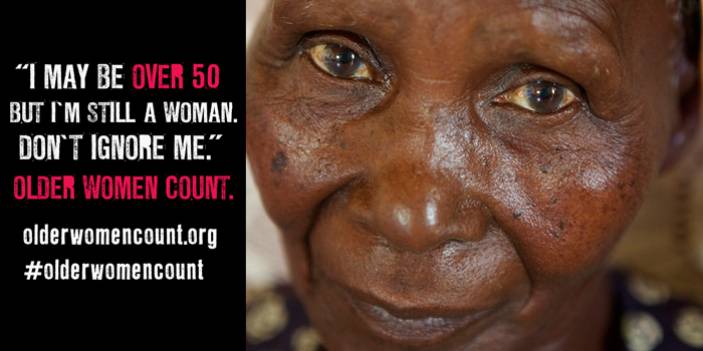Making older women count
Despite increasing evidence as to how discrimination affects women throughout the life course, older women are almost entirely absent from the debate on gender equality and sustainable development. Older women are at risk of violence, are excluded from sexual and reproductive health services, and face disproportionate levels of poverty.
HelpAge is continuing its call for data to monitor the achievement of gender equality across the Sustainable Development Goals (SDGs) to be disaggregated by sex and age and other grounds for discrimination prohibited by international human rights law. Monitoring must include the 900 million women – that is 24% of the world’s women – who are over 49 years old.
Age brackets and upper age limits are incompatible with the promise that Member States have made to “leave no one behind”. Where age brackets and upper age limits still exist, concrete commitments must be made to removing them. As it says in A/Res/70/1 paragraph 20: “The achievement of full human potential and of sustainable development is not possible if one half of humanity continues to be denied its full human rights and opportunities”.

Commission on the Status of Women (CSW) 60th session, 14- 24 March 2016
The priority theme for this year’s CSW is “women’s empowerment and its link to sustainable development”. The review theme is “the elimination and prevention of all forms of violence against women and girls” – conclusions that were agreed at the 57th CSW session).
The CSW and UN Women have a critical role to play in monitoring the achievement of gender equality, the empowerment of women, and the full enjoyment of human rights for all women and girls across their life course in the implementation and monitoring of all the SDGs.
In 2016 HelpAge is calling for an outcome document that:
• maintains strong language on women’s human rights, especially the multiple and intersecting discrimination that women can be subjected to
• recognises that gender equality, women’s empowerment and the full enjoyment of human rights must be achieved for all women, throughout their entire life course, if the SDGs are to achieve their stated aim of “leaving no one behind”
• establishes a role for the CSW in the monitoring of the SDGs in relation to goal five and gender equality across others goals
• establishes a central role for women’s organisations and other civil society organisations in this monitoring of the SDGs.
HelpAge network at the CSW
Monday 14 March – Bridget Sleap will be speaking at “Widowhood: an economic, social, and humanitarian crisis”.
Tuesday 15 March – Baroness Verma will give the opening address at the AARP lunch briefing “Neglect abuse and violence against older women”. Follow on Twitter using #EmpowerWomen #CSW60.
Wednesday 16 March – Toby Porter will be speaking at the AARP lunch briefing “Women’s empowerment and sustainable development”. Follow on Twitter using #EmpowerWomen #CSW60
Friday 18 March – Bridget Sleap will be speaking at “Ageism and widowhood: a focus on the forgotten”.
Find out about all the CSW 60 events.
How you can support older women at CSW 60
Read and share the joint NGO statement prepared for CSW 60.
Join all our CSW 60 discussions @HelpAge using #OlderWomenCount and #CSW60.
